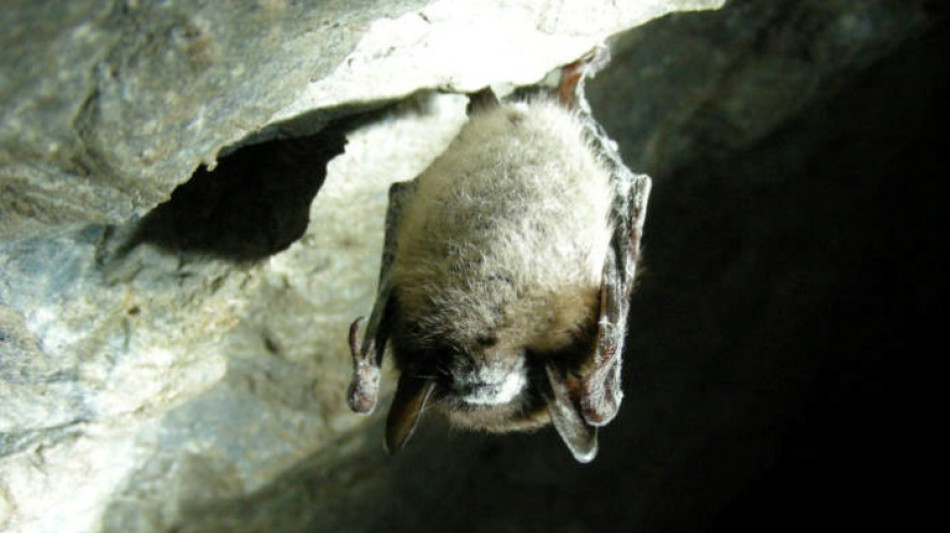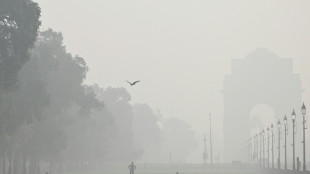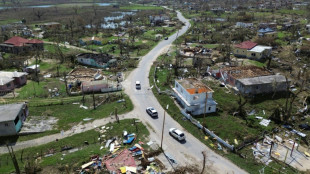
-
 US Navy veterans battle PTSD with psychedelics
US Navy veterans battle PTSD with psychedelics
-
'Unheard of': Dodgers in awe of iron man Yamamoto

-
 UK police probe mass train stabbing that wounded 10
UK police probe mass train stabbing that wounded 10
-
'It's hard' - Jays manager Schneider rues missed chances in World Series defeat

-
 Women's cricket set for new champion as India, South Africa clash
Women's cricket set for new champion as India, South Africa clash
-
Messi scores but Miami lose as Nashville level MLS Cup playoff series

-
 Dodgers clinch back-to-back World Series as Blue Jays downed in thriller
Dodgers clinch back-to-back World Series as Blue Jays downed in thriller
-
Vietnam flood death toll rises to 35: disaster agency

-
 History-making Japan golf twins push each other to greater heights
History-making Japan golf twins push each other to greater heights
-
Death becomes a growing business in ageing, lonely South Korea

-
 India's cloud seeding trials 'costly spectacle'
India's cloud seeding trials 'costly spectacle'
-
Chiba wins women's title, Malinin leads at Skate Canada

-
 Siakam sparks injury-hit Pacers to season's first NBA win
Siakam sparks injury-hit Pacers to season's first NBA win
-
Denmark's fabled restaurant noma sells products to amateur cooks

-
 UK train stabbing wounds 10, two suspects arrested
UK train stabbing wounds 10, two suspects arrested
-
Nashville top Messi's Miami 2-1 to level MLS Cup playoff series

-
 Fergie, her daughters and the corgis hit by Andrew crisis
Fergie, her daughters and the corgis hit by Andrew crisis
-
'I can't eat': Millions risk losing food aid during US shutdown

-
 High price of gold inspires new rush in California
High price of gold inspires new rush in California
-
'Swing for the fences': Carney promises bold budget as US threat grows

-
 UK police arrest two after 'multiple people' stabbed on train
UK police arrest two after 'multiple people' stabbed on train
-
NBA Hawks lose guard Young for four weeks with knee sprain

-
 50 dead as Caribbean digs out from Hurricane Melissa
50 dead as Caribbean digs out from Hurricane Melissa
-
Forever Young gives Japan first Breeders' Cup Classic triumph

-
 Mbappe's Real Madrid extend Liga lead, Villarreal move second
Mbappe's Real Madrid extend Liga lead, Villarreal move second
-
Salah savours 'great feeling' after 250th Liverpool goal

-
 Ethical Diamond surges to upset win in $5 million Breeders' Cup Turf
Ethical Diamond surges to upset win in $5 million Breeders' Cup Turf
-
Kinghorn kicks Toulouse to Top 14 summit

-
 Mbappe extends Real Madrid's Liga lead in Valencia rout
Mbappe extends Real Madrid's Liga lead in Valencia rout
-
All Blacks sink 14-man Ireland 26-13 in Chicago Test

-
 World champ Malinin takes lead at Skate Canada
World champ Malinin takes lead at Skate Canada
-
Liverpool snap losing streak as Salah hits 250 goals in Villa win

-
 Salah's 250th Liverpool goal sinks Villa as Arsenal cruise at Burnley
Salah's 250th Liverpool goal sinks Villa as Arsenal cruise at Burnley
-
Morant suspended by Grizzlies after rebuking coaching staff

-
 Spalletti begins Juve tenure with win at Cremonese but Napoli held
Spalletti begins Juve tenure with win at Cremonese but Napoli held
-
Frank refuses to condemn Van de Ven, Spence for snub in Spurs defeat

-
 France superstar Dupont extends Toulouse deal
France superstar Dupont extends Toulouse deal
-
Egypt officially opens grand museum near pyramids

-
 French fraud watchdog reports Shein for 'childlike' sex dolls
French fraud watchdog reports Shein for 'childlike' sex dolls
-
Scotland thrash USA before All Blacks' clash

-
 Five things to know about the Grand Egyptian Museum
Five things to know about the Grand Egyptian Museum
-
Bayern rest stars but ease past Leverkusen before PSG clash

-
 Dead quiet: Paris Catacombs close for renovations
Dead quiet: Paris Catacombs close for renovations
-
Families separated, children killed as survivors flee Sudan's 'apocalyptic' El-Fasher

-
 Napoli held by Como as Spalletti begins Juve adventure
Napoli held by Como as Spalletti begins Juve adventure
-
Southampton boss Still vows to fight on as pressure mounts

-
 Borthwick hails 'ball of energy' Pollock as England down Australia
Borthwick hails 'ball of energy' Pollock as England down Australia
-
Egypt opens grand museum in lavish, pharaonic ceremony

-
 Joao Pedro strikes at last as Chelsea edge past Spurs
Joao Pedro strikes at last as Chelsea edge past Spurs
-
Ohtani to open for Dodgers in World Series deciding game seven


US bat decline triggered pesticide surge, 1,300 baby deaths: study
A collapse in North America's bat population led to a surge in pesticide use by farmers as an alternative way to protect crops from insects -- in turn triggering a rise in infant mortalities, a study revealed Thursday.
The paper, published in Science, provides concrete evidence supporting predictions that global biodiversity decline will have severe consequences for humans.
"Ecologists have been warning us that we're losing species left and right... and that will potentially have catastrophic impacts on humanity," author Eyal Frank, of the University of Chicago, told AFP.
"However, there was not a whole lot of empirical validation to those predictions because it is very hard to go and manipulate an ecosystem at a very large spatial scale," added the environmental economist.
- Bats are pest control -
For his work, Frank took advantage of a "natural experiment" -- the sudden emergence of a deadly bat disease -- to quantify the benefits that bug-eating bats provide in pest control.
White-nose syndrome (WNS), caused by an invasive fungus, began spreading across the United States from New York in 2006 -- killing bats by waking them during hibernation in winter, when they lack insects to feed on, and trying to stay warm saps their energy.
The loss of millions of bats shocked the ecosystem.
To investigate, Frank tracked the spread of WNS in the eastern US and compared insecticide use in affected counties versus unaffected ones.
He found a massive 31 percent increase in pesticide use where bat populations had declined.
Given the link between pesticides and poor health outcomes, Frank examined whether increased pesticide use correlated with higher infant mortality rates.
With more pesticides, the infant mortality rate rose by nearly eight percent, translating to 1,334 additional infant deaths since the bat disease took hold -- with contaminated water and air likely serving as pathways for the chemicals to enter humans.
Frank emphasized that the staggered spread of the wildlife disease supports his inference that the bat die-off directly caused the spike in infant mortality, rather than it merely being a coincidence that could be explained by other rural hardships such as drug abuse or poverty.
Any other explanation would have to align with the same expansion path and timing of WNS.
- Cascading impacts -
"We need better data on the presence of pesticides in the environment," Frank said, adding that his findings also underscore the need to protect bats.
Vaccines are being developed against WNS, but bats are also threatened by habitat loss, climate change and wind farms.
The new work adds to the body of evidence showing the cascading impacts of wildlife loss on ecosystems.
A recent study found that reintroducing wolves in Wisconsin reduced vehicle collisions with deer as wolves establish their patrols along highways.
In Central America, declines in amphibians and snakes have led to spikes in human malaria cases.
"Stemming the biodiversity crisis is crucial to maintaining the many benefits that ecosystems provide for which technological substitutes cannot readily, or perhaps, ever replace," scientists at the University of California, Santa Barbara and University of British Columbia wrote in a commentary.
"Studies like that of Frank are important for understanding the benefits of allocating scarce resources for biodiversity conservation."
A.Ammann--VB




